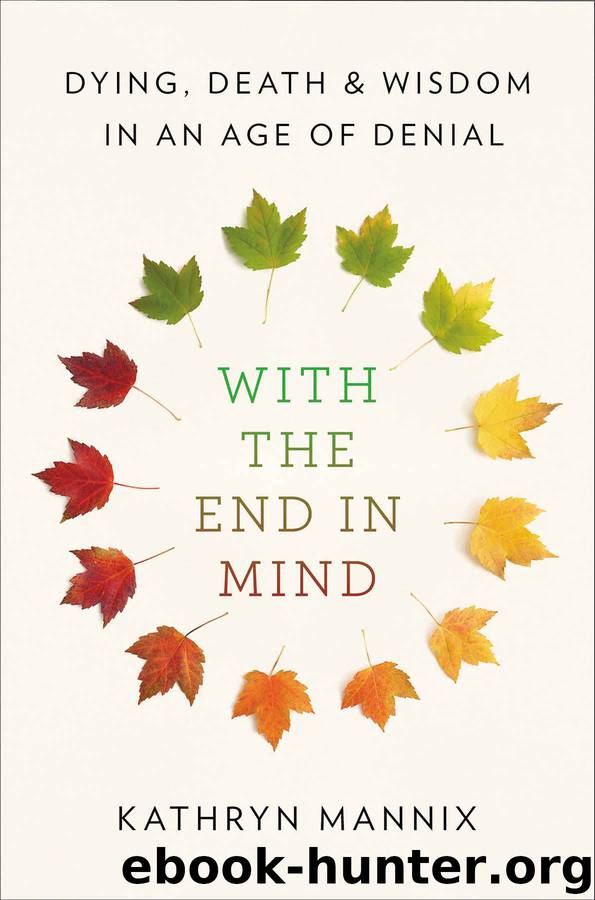With the End in Mind: Dying, Death, and Wisdom in an Age of Denial by Kathryn Mannix

Author:Kathryn Mannix [Mannix, Kathryn]
Language: eng
Format: azw3
Tags: Relationships / Death, Grief, Bereavement, Self-Help / Death, Grief, Bereavement, Social Science / Death &, Dying, Family &
Publisher: Little, Brown and Company
Published: 2018-01-16T05:00:00+00:00
Pause for Thought: Naming Death
Notice how often you hear euphemisms like ‘passed’, ‘passed away’, ‘lost’, in conversations and in the media. How can we talk about dying, plan our care or support those we love during dying, theirs or ours, if we are not prepared to name death? Do you and your family avoid the D-words? If you do, how could you begin to change this?
If you were approaching your own death, who would be the important people to tell? Who do you hope would tell you if they knew that their death was approaching?
Is death something the younger members of your family feel allowed to talk and ask about? Don’t assume because they never mention it that they don’t know. Just like Joe and Nelly, even young children may try to avoid upsetting adult family members if they get the idea that a particular subject will cause distress if spoken about.
How do you and the people you are closest to make their views known? Do you all like to tell people clearly, or do some of you prefer to drop hints? How good are the rest of you at picking up each other’s cues?
Do you know what kind of care your loved ones would like as their life’s end approaches? Or have you assumed that what you would like is also what they would like, or that you will be able to guess if you need to?
If you were close to dying, would you prioritise being as awake and alert as your condition would allow, or would you prefer to be sleepier and less aware of the situation and the people around you?
What balance do you see between the length of time you live, and the quality of life you are living? Do you think that, if you had a choice, you would choose to accept or to forgo treatments that extend your life if they do not restore quality? Would you prefer to live for as long as possible, even if it means being supported by machines in an intensive care unit, or to make plans that declare at what level escalation of treatments should stop, to focus on comfort instead of prolonging life? Do you feel confident that, if you suddenly became life-threateningly ill, your closest family and friends would know your wishes and preferences about your care?
These are big questions. They may take several conversations to work through. Do consider taking the time to discuss them now, rather than waiting until it becomes a matter of life or death. The staff in the emergency department, the rapid response team or the ambulance crew will be glad to know that you have made your wishes clear. And so will the loved ones who are charged with the responsibility of representing your views at a very challenging time.
If you already have a serious medical condition, consider asking your GP or hospital specialist about what particular emergency situations it would be wise to plan for. In many areas, people can have plans written to describe what care to put in place if a foreseeable crisis arises.
Download
This site does not store any files on its server. We only index and link to content provided by other sites. Please contact the content providers to delete copyright contents if any and email us, we'll remove relevant links or contents immediately.
They Both Die at the End by Adam Silvera(9818)
Thirteen Reasons Why by Jay Asher(8910)
The Space Between by Michelle L. Teichman(6941)
Suicide Notes by Michael Thomas Ford(4827)
Tuesdays with Morrie by Mitch Albom(4784)
Suicide: A Study in Sociology by Emile Durkheim(3023)
The Checklist Manifesto by Atul Gawande(2854)
Tuesdays With Morrie by Mitch Albom(2762)
In the Woods by Tana French(2599)
Bossypants by Tina Fey(2532)
Robin by Dave Itzkoff(2441)
Olive Kitteridge by Elizabeth Strout(2372)
No Ashes in the Fire by Darnell L Moore(2333)
Reservoir 13 by Jon McGregor(2304)
End of Days by Sylvia Browne(2187)
All Things New by John Eldredge(2162)
Bus on Jaffa Road by Mike Kelly(2160)
Scar Tissue by Anthony Kiedis(2137)
No Time to Say Goodbye(2118)
